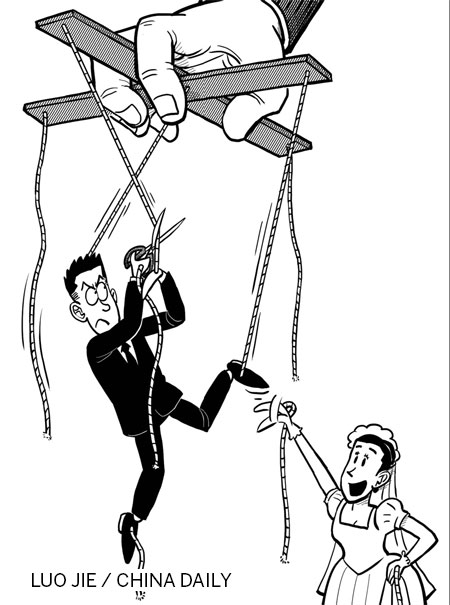
Bombarded with eager inquiries from their parents and relatives about whether or not they have a boyfriend or girlfriend, Spring Festival has become something of a nightmare for many single people of marriageable age in recent years.
A micro blog discussion about the hassles single youths endured during the Chinese New Year revealed that the blessing they are most fed up with is: you'll bring home a boyfriend or girlfriend next year. To escape from their parents' eager entreaties for them to find a partner, some young people even "hire" a stranger to act as their boyfriend or girlfriend in front of their parents.
The phenomenon is so common even celebrities can't escape it. The actress Li Bingbing has revealed that because her parents are urging her to get married, she has been on blind dates arranged by her friend Wendi Deng Murdoch several times.
"Chinese-style urged marriage", as it is called by netizens, was one of the top three hot micro blog topics for a whole week in early February, with up to 98.6 million comments on such "suffering" during Spring Festival and Valentine's Day.
But for Luo Huilan, a professor of women's studies at China Women's University in Beijing, the term is inaccurate and better interpreted as parents' anxiety about their children, daughters in particular.
Luo says this excessive pressure from parents for their children to marry can be largely attributed to Chinese people's traditional understanding of marriage. In Chinese tradition, marriage is not only an emotional and physical union, but also an expression of filial piety, responsibility and even physical and mental health. It is deeply rooted in most Chinese parents' minds that marriage means happiness while being unwed means being miserable.
Though perhaps understandable, it is irresponsible for parents to push their single children to get married before they are ready. Unlike their parents' generation, today's youths attach more importance to individuality and their emotional life and emphasize the quality of married life. Moreover, when choosing a life mate, men tend to want a woman who is younger, less educated and economically inferior to them, while women want to find a man they can look up to. However, as there are not enough single men available that meet that requirement inevitably some women are "left over". Parents' urging these women to marry will only add to the pressure and anxiety they feel.
Also, the rising costs of living, especially the soaring outlay needed to own a house and car, have altered young people's views on marriage. What's worse, owing to a sense of filial piety or seeking to put an end to the constant barrage of questions, some young people struggling to find their Mister or Miss Right, eventually go on blind dates arranged by their parents and end up in flash marriages, or sensing the clock is ticking down on their eligibility they marry someone totally unsuitable. Without their parents' sense of duty to the institution of marriage and lacking their perseverance in the face of adversity, many of these marriages end in divorce.
Rather than go through this process, more and more young people in metropolises such as Beijing, Shanghai and Guangzhou, are taking the initiative to stay single.
According to Luo, more women are voluntarily making the decision not to get married. As women do not necessarily have to rely on their spouse to support them anymore, marriage is no longer a necessity to survive, and as such some women choose to dispense with it all together.
To marry or not to marry should be up to the individual. We should admit and accept the fact that views on mar- riage are changing and that everyone needs to treat people's life choices with respect, whether they agree with them or not. Marriage should be a blessing, and not a burden. Perhaps if parents listened to their children instead of trying to force them to be "happy and normal" they would find their children more willing to talk to them about their lives.
The author is a reporter with China Daily.
xiaolixin@chinadaily.com.cn
(China Daily 03/15/2012 page10)